

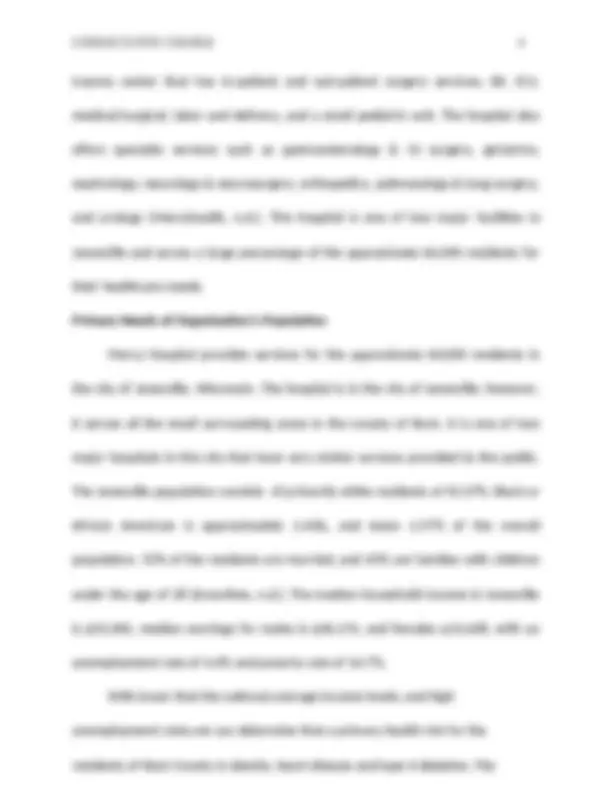

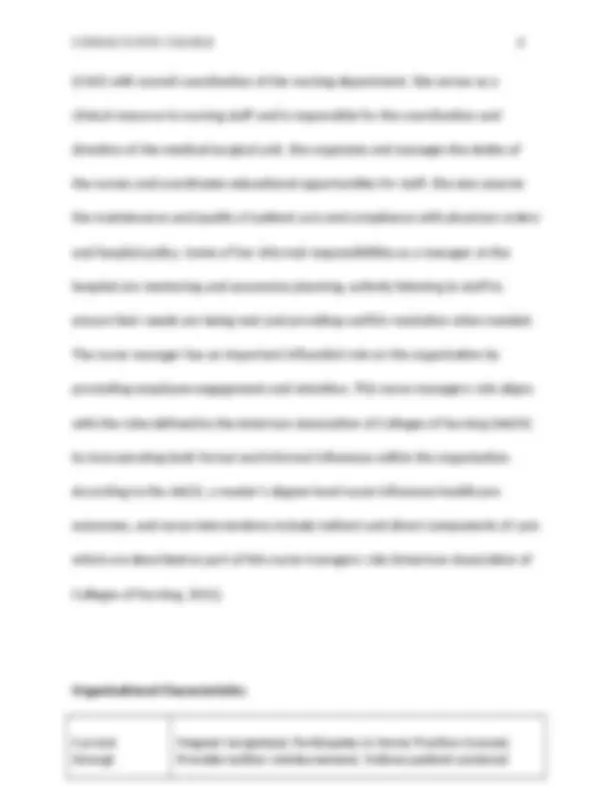
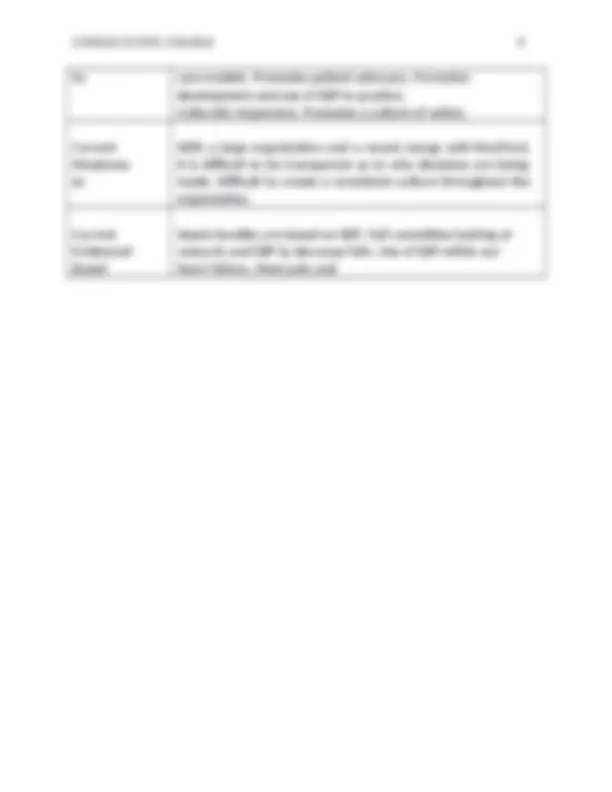
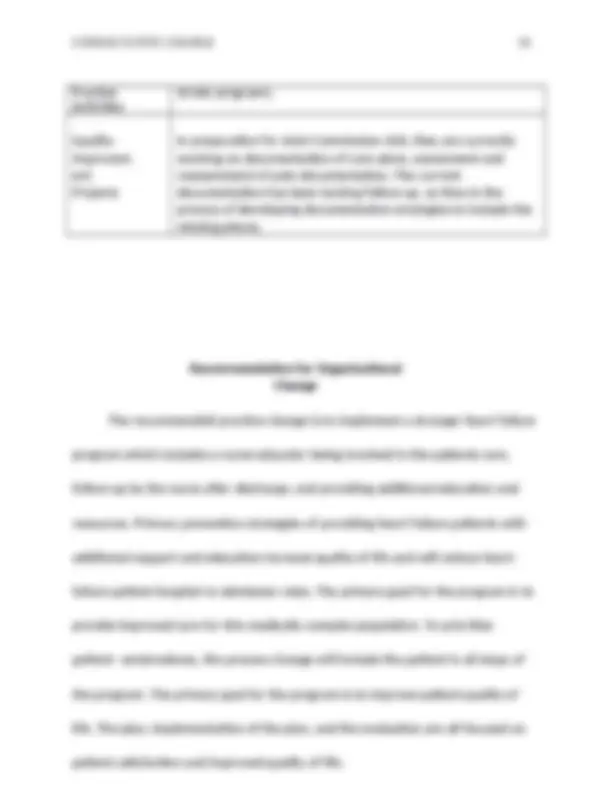



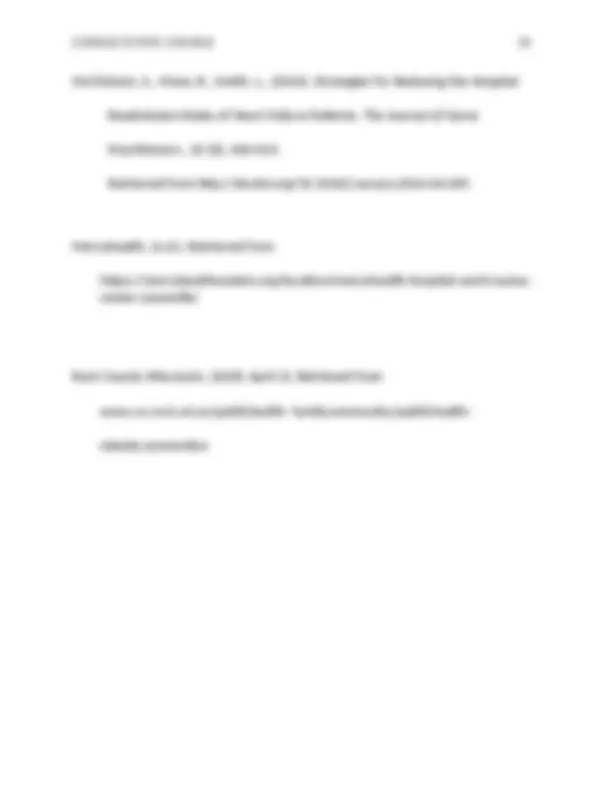


Study with the several resources on Docsity

Earn points by helping other students or get them with a premium plan


Prepare for your exams
Study with the several resources on Docsity

Earn points to download
Earn points by helping other students or get them with a premium plan
Community
Ask the community for help and clear up your study doubts
Discover the best universities in your country according to Docsity users
Free resources
Download our free guides on studying techniques, anxiety management strategies, and thesis advice from Docsity tutors
A case study of a consultative change recommendation for improving heart failure readmission rates at mercy health system. It analyzes the organization's characteristics, identifies the primary needs of the population, and proposes a stronger heart failure program with a nurse educator, follow-up care, and patient education. The document highlights the importance of patient-centered care and evidence-based practice in reducing readmissions and improving patient satisfaction.
Typology: Exams
1 / 18

This page cannot be seen from the preview
Don't miss anything!











Running head: CONSULTATIVE CHANGE RECOMMENDATIONS 1
Essentials of Advanced Nursing Practice Field Experience 02/16/
RECOMMENDATIONS Advanced practicing nurses (APN) have a responsibility to promote positive health outcomes. APN’s are leaders, which give them opportunities to be part of positive changes within their organizations. APN’s create positive changes by working with inter-professional teams and apply their knowledge to create positive changes. Purpose of Consultation and Overview of the Consultation Process In this scenario I am a nurse consultant that has been assigned a healthcare system to review and identify an improvement plan that is needed within the organization. For this process I utilized the Center for Medicare Services (CMS) website to review HCAHPS scores from my hospital and hospitals in the surrounding areas. On the CMS website I can compare the quantitative data collected for local hospital and compare them to the national average. The data will help to identify areas that need improvement. For this project, I have chosen heart failure readmissions to be the focus for my process improvement plan. Organizational Analysis Description of Organization Mercy Health System is a non-profit organization with the primary and original location in Janesville, Wisconsin. The health care system continues to grow and is regional with over 85 facilities throughout southern Wisconsin and northern Illinois and employs over 8,000 people (Mercyhealth, n.d.). The average
RECOMMENDATIONS trauma center that has in-patient and out-patient surgery services, ER, ICU, medical/surgical, labor and delivery, and a small pediatric unit. The hospital also offers specialty services such as gastroenterology & GI surgery, geriatrics, nephrology, neurology & neurosurgery, orthopedics, pulmonology & lung surgery, and urology (Mercyhealth, n.d.). This hospital is one of two major facilities in Janesville and serves a large percentage of the approximate 64,000 residents for their healthcare needs. Primary Needs of Organization’s Population Mercy Hospital provides services for the approximate 64,000 residents in the city of Janesville, Wisconsin. The hospital is in the city of Janesville; however, it serves all the small surrounding areas in the county of Rock. It is one of two major hospitals in this city that have very similar services provided to the public. The Janesville population consists of primarily white residents at 92.37%. Black or African American is approximately 1.43&, and Asian 1.57% of the overall population. 55% of the residents are married, and 45% are families with children under the age of 18 (Areavibes, n.d.). The median household income in Janesville is $50,300, median earnings for males is $36,174, and females $23,428, with an unemployment rate of 4.4% and poverty rate of 14.7%. With lower that the national average income levels, and high unemployment rates we can determine that a primary health risk for the residents of Rock County is obesity, heart disease and type II diabetes. The
RECOMMENDATIONS obesity rates are related to socioeconomical status (Center for Disease Control and Prevention, 2017). According to the county health rankings listed on the county website, Rock County is the second most obese county in the state of Wisconsin (Rock County Wisconsin, 2017). According to the Center for Disease Control and Prevention in 2015-2016, the leading cause of preventable deaths are related to heart disease, cardiovascular accidents, certain
RECOMMENDATIONS and increase patient satisfaction and quality of life (Al-Sutari, et al., 2017). Nurse Leader Interview Summary Role of the Nurse Leader The nurse that I interviewed is the supervisor of the medical/surgical unit at Mercy Hospital. Per our discussion, her role consists of assisting the Chief Nursing Officer
RECOMMENDATIONS (CNO) with overall coordination of the nursing department. She serves as a clinical resource to nursing staff and is responsible for the coordination and direction of the medical/surgical unit. She organizes and manages the duties of the nurses and coordinates educational opportunities for staff. She also assures the maintenance and quality of patient care and compliance with physician orders and hospital policy. Some of her informal responsibilities as a manager at the hospital are mentoring and succession planning, actively listening to staff to ensure their needs are being met and providing conflict resolution when needed. The nurse manager has an important influential role on the organization by promoting employee engagement and retention. This nurse managers role aligns with the roles defined by the American Association of Colleges of Nursing (AACN) by incorporating both formal and informal influences within the organization. According to the AACN, a master’s degree level nurse influences healthcare outcomes, and nurse interventions include indirect and direct components of care which are described as part of this nurse managers role (American Association of Colleges of Nursing, 2011). Organizational Characteristics Current Strengt Magnet recognized. Participates in Nurse Practice Counsel. Provides tuition reimbursement. Follows patient-centered
RECOMMENDATIONS Practice Activities stroke programs. Quality Improvem ent Projects In preparation for Joint Commission visit, they are currently working on documentation of care plans, assessment and reassessment of pain documentation. The current documentation has been lacking follow-up, so they in the process of developing documentation strategies to include the missing pieces. Recommendation for Organizational Change The recommended practice change is to implement a stronger heart failure program which includes a nurse educator being involved in the patients care, follow-up by the nurse after discharge, and providing additional education and resources. Primary prevention strategies of providing heart failure patients with additional support and education increase quality of life and will reduce heart failure patient hospital re-admission rates. The primary goal for the program is to provide improved care for this medically complex population. To prioritize patient- centeredness, the process change will include the patient in all steps of the program. The primary goal for the program is to improve patient quality of life. The plan, implementation of the plan, and the evaluation are all focused on patient satisfaction and improved quality of life.
RECOMMENDATIONS The rationale for the process improvement project is that heart failure readmissions negatively impact the hospitals reimbursement rates and have a significant negative impact on patient satisfaction and quality of life. An estimated 90% of patients with heart failure that are readmitted into the hospitals are preventable (McClintock, et al., 2017). The readmission rates for heart failure patients not only cost the healthcare facility a sizeable amount of money, this also negatively effects patient satisfaction and quality of life. The purpose for an improved
RECOMMENDATIONS has been achieved. Measuring the improvement following the practice change would involve on-going tracking of heart failure readmission rates. Part of the process would include the implementation of an area for documentation within the electronic health record for the nurse educator to document the teaching provided and the patients understanding of the teaching. Monitoring of this would have to be on-going to ensure the education continues to be provided to the patient. Monitoring the
RECOMMENDATIONS HCAHP scores and seeing a decrease in the readmission scores would be a good indicator that the process improvement plan was effective. Less hospital admissions are good indicators that the patient has better control of symptoms and able to self-manage symptoms without the hospital environment, and less hospitalizations are also an indicator of improved quality of life.
RECOMMENDATIONS Al-Sutari, M., Ahmad, M., (2017). Effect of educational program on self-care behavior and health outcome among patients with heart failure: an experimental study (2017). International Journal of Evidenced-Based Healthcare. 178-185. doi:10.1097/XEB American Association of Colleges of Nursing. (2011). The essentials of master’s education in nursing. Available from http://www.aacnnursing.org/portals/42/publications/mastersessentials11. pdf Areavibes, (n.d.). Janesville demographics profile. Retrieved from http://www.areavibes.com/janesville-wi/demogr aphics/ Center for Disease Control and Prevention. (2017). Strategies to prevent obesity and other chronic diseases. Retrieved from https://www.cdc.gov/obesity/downloads/PA_2011_WEB.pdf Center for Medicare services. (n.d.). CMS.gov. Retrieved from
RECOMMENDATIONS https://www.medicare.gov/hospitalcompare/ compare.html#cmprTab=1&vwgrph=1&cmp rID=520066%2C520208&cmprDist=0.9%2C2.9&dist=50&loc=JANESVILLE%2C %20WI&lat=42.6827885&lng=-89.